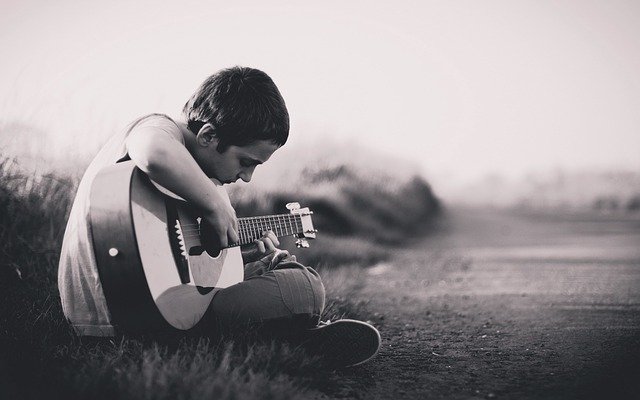Mastering a musical instrument can not only bring a song to a person’s life. Studying an instrument gives a personal discipline, improved cognitive function, and greater motor-skill coordination. It can also be a boon to creativity and emotional expression, helping a stressed person better cope with trauma. Of course, becoming competent at an instrument also means that a musical career becomes an option. The trick here is to find an instrument that resonates with someone unfamiliar with the music. Considering how daunting the options for a starter instrument can be, we present several suitable candidates.
Acoustic Guitar
The guitar is one of the most prevalent instruments on the planet to the point that it becomes a suitable starter instrument by 6 years of age. Acoustic guitars are also a slight bit easier to learn than an electric version and the sheer variety of sizes and styles means that there is bound to be a perfect guitar for any student. Guitars also complement a lot of other musical instruments, meaning that a person can easily transfer their musical skills to a band.
Ukulele
A ukulele is like a miniature guitar with four nylon, rather than steel or nickel, strings. The small size also makes it quite feasible for taking it on the go.
Trumpet
The trumpet has been around since 1,500 BCE and is an excellent tool to teach innovation and train one’s stamina. You not only need to know which keys to hit but also how to control your breathing to properly play the trumpet. While the trumpet can be a lot of fun to play, it is better suited to playing existing pieces than experimenting with a freeform sound.
Violin
The “queen of instruments” has been a prominent musical instrument for roughly 500 years. Kids as young as six years of age can begin to learn to play the violin, meaning you can score one heck of an early Christmas or birthday present with a simple search for the best violin for a beginner. Like with guitars, there are several violins to suit different sizes and needs. Beginners are cautioned to start with an acoustic version.
Cello
While larger than a violin, the cello is a wonderful instrument for tapping into a wide variety of emotions with its sound. It also works wonderfully on its own or in tandem with the violin and/or viola. In some ways, a cello is like a larger violin in that it demands determination and guidance to achieve success.
Drums
Drums are one of the most amazing instruments to play. As the most iconic percussion instrument around, all other instruments rely on the drums to set a song’s tempo. Beginning drummers should be mindful that they do not develop problematic behaviors during their lessons; it is best to focus on simple beats and drum rolls before getting into the truly intricate segments.
Recorder
This is the easiest woodwind to pick up, to the point that most grade school students get one when they take a music class. The recorder is great for learning music without a teacher; all you need is a fingering chart. A recorder is very easy to carry and is the stepping stone to all other woodwinds due to the need to understand fingering and breath control. Once someone has become comfortable with the recorder, he can move on to more pleasant instruments like the clarinet or even flute.
Saxophone
The “sax” is an iconic instrument that has been competently used for pieces in multiple genres of music. Note that there are multiple varieties of saxophone, based on the same roles as a choral singer can have: alto, baritone, soprano, and tenor. Beginners should start with an alto sax.
Harmonica
Arguably the easiest to carry of the instruments on this list, the harmonica is both versatile and quite friendly to newcomers to music. Not only has this instrument found its way into a wide array of different music genres, but it is also incredibly cheap to make.
The Finale
When choosing an instrument for a beginner, it is best to pick whichever instrument calls to the beginner’s soul. Beyond the sound of the instrument, one should consider how much physicality and breath control, if any, is required to competently produce music. The most important detail to remember is that learning an instrument is a journey of time and dedication.
